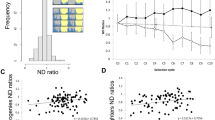Summary
Male courtship behavior in the fruitflyDrosophila melanogaster can be altered by experience and the normal experience-dependent behavioral modification does not occur in flies carrying mutations known to affect conditioned responses (Siegel and Hall 1979; Gailey et al. 1982). The conditioned modification of male courtship is also disrupted by any of 5 independently isolated mutations (per l,per l2,Andante, psi-2 and psi-3) that bring about longer period biological rhythms (Table 1). However, males carrying eitherper s orper o, which have shortened periods and arrhythmic behavior, respectively, are normally conditioned. The failure ofper lmales to respond normally to conditioning cues cannot easily be accounted for by a second mutation outside the clock locus or by multigenic factors. Indeed, the genetic lesion which is responsible for the defective behavioral modification ofper lmutants maps to the chromosomal interval in which theper locus itself resides (Table 3). The aberrant behavior ofper lmutants might be a result of their abnormal daily periodicity, but it cannot be explained by a change in the time of day for optimal conditioning (Table 4). Alternatively, the poor conditioning performance of longperiod clock mutants may indicate that short-cycle endogenous timing mechanisms play an integral role in conditioning behavior.
Similar content being viewed by others
Abbreviations
- CI :
-
courtship index
- λc :
-
conditioning index for modification of male courtship behavior
References
Aceves-Piña EO, Quinn WG (1979) Learning in normal and mutantDrosophila larvae. Science 206:93–96
Bastock M, Manning A (1955) Courtship ofDrosophila melanogaster. Behavior 8:85–111
Bennet-Clark HC, Ewing AW (1969) Pulse intervals as a critical parameter in the courtship song ofDrosophila melanogaster. Anim Behav 17:755–759
Booker R, Quinn WG (1981) Conditioning of leg position in normal and mutantDrosophila. Proc Natl Acad Sci USA 76:3940–3944
Byers D, Davis RL, Kiger JA (1981) Defect in cyclic-AMP phosphodiesterase due to thedunce mutation of learning inDrosophila melanogaster. Nature (London) 289:79–81
Dickinson A (1980) Contemporary animal learning theory. Cambridge University Press, London
Dudai Y, Jan Y-N, Byers D, Quinn WG, Benzer S (1976)dunce, a mutant ofDrosophila deficient in learning. Proc Natl Acad Sci USA 73:1684–1688
Duerr JS, Quinn WG (1982) ThreeDrosophila mutations that block associative learning also affect habituation and sensitization. Proc Natl Acad Sci USA 79:3646–3650
Emlen ST (1972) An experimental analysis of the parameters of bird song eliciting species recognition. Behaviour 41:130–171
Gailey DA, Jackson FR, Siegel RW (1982) Male courtship inDrosophila: The conditioned response to immature males and its genetic control. Genetics 102:771–782
Gerhardt HC (1978) Mating call recognition in the green tree-frog (Hyla cinerea): The significance of some fine-temporal properties. J Exp Biol 74:59–73
Hall JC, Siegel RW, Tompkins L, Kyriacou CP (1980) Neurogenetics of courtship inDrosophila. Stadler Symp 12:43–82
Hardeland R, Stange G (1971) Einflüsse von Geschlecht und Alter auf die lokomotorische Aktivität vonDrosophila. J Insect Physiol 17:427–434
Holloway FA, Wansley R (1973) Multiphasic retention deficits at periodic learning intervals after passive-avoidance learning. Science 180:208–210
Hopkins CD, Bass AH (1981) Temporal coding of species recognition signals in an electric fish. Science 212:85–87
Hotta Y, Benzer S (1976) Courtship inDrosophila mosaics: sex-specific loci for sequential action patterns. Proc Natl Acad Sci USA 73:4154–4158
Jackson FR (1982) A genetic analysis of temporally-programmed behavior inDrosophila melanogaster: Circadian rhythms, ultradian rhythms, and the role of biological clocks in learning Dissertation, University of California, Los Angeles
Konopka RJ (1972) Circadian clock mutants ofDrosophila melanogaster. Dissertation. California Institute of Technology, Pasadena
Konopka RJ, Benzer S (1971) Clock mutants ofDrosophila melanogaster. Proc Natl Acad Sci USA 68:2112–2116
Kyriacou CP, Hall JC (1980) Circadian rhythm mutations inDrosophila melanogaster affect short-term fluctuations in the male's courtship song. Proc Natl Acad Sci USA 77:6729–6733
Kyriacou CP, Hall JC (1982) The function of courtship song rhythms inDrosophila. Anim Behav 30:794–801
Livingstone MS, Sziber PP, Quinn WG (1982) Defective adenylate cyclase in theDrosophila learning mutant, rutabaga. Neurosci Abstr 8:384
Narins PM, Capranica RR (1978) Communicative significance of the two-note call of the treefrogEleutherodactylus coqui. J Comp Physiol 127:1–9
Pittendrigh CS (1974) Circadian oscillations in cells and the circadian organization of multicellular systems. In: Schmitt FO, Worden FG (eds) The neurosciences third study program. MIT Press, Cambridge, pp 437–458
Pittendrigh CS, Bruce VG (1957) An oscillator model for biological clocks. In: Rudnik (ed) Rhythmic and synthetic processes in growth. Princeton University Press, Princeton, pp 75–109
Popov AV, Shuvalov VF (1977) Phonotactic behavior of crickets. J Comp Physiol 119:111–126
Quinn WG, Harris W, Benzer S (1974) Conditioned behavior inDrosophila melanogaster. Proc Natl Acad Sci USA 71:708–712
Rodrigues V (1980) Olfactory behavior ofDrosophila melanogaster. In: Siddiqi O, Babu P, Hall LM, Hall JC (eds) Development and neurobiology ofDrosophila. Basic life Sciences, vol 16. Plenum Press, New York London, pp 361–371
Schilcher F von (1976) The function of pulse song and sine song in the courtship ofDrosophila melanogaster. Anim Behav 24:622–625
Siegel RW, Hall JC (1979) Conditioned responses in courtship behavior of normal and mutantDrosophila. Proc Natl Acad Sci USA 76:3430–3434
Shitamoto T, Ikeda H (1981) Differences in the diurnal rhythmicity of mating activity inD. melanogaster. Drosophila Information Service 56:122–123
Smith RF (1982) Genetic analysis of the circadian clock system ofDrosophila melanogaster. Dissertation. California Institute of Technology, Pasadena
Tapp WN, Holloway FA (1981) Phase shifting circadian rhythms produces retrograde amnesia. Science 211:1056–1058
Temple BL, Dawson DR, Quinn WG (1983) Reward learning in normal and mutantDrosophila. Proc Natl Acad Sci USA 80:1482–1486
Temple BL, Livingstone MS (1981) A mutation inDrosophila that reduces dopamine and serotonin synthesis abolishes associative learning. Soc Neurosci Abstr 7:361
Walker TJ (1957) Specificity in response of female tree crickets (Orthoptera, Gryllidae, Oecanthinae) to calling songs of the males. Ann Entomol Soc Am 50:626–636
Zaretsky MD (1972) Specificity of the calling song and shortterm changes in the phonotactic response by female cricketsScapsipedus marginatus (Gryllidae). J Comp Physiol 79:153–172
Author information
Authors and Affiliations
Rights and permissions
About this article
Cite this article
Jackson, F.R., Gailey, D.A. & Siegel, R.W. Biological rhythm mutations affect an experience-dependent modification of male courtship behavior inDrosophila melanogaster . J. Comp. Physiol. 151, 545–552 (1983). https://doi.org/10.1007/BF00605470
Accepted:
Issue Date:
DOI: https://doi.org/10.1007/BF00605470




